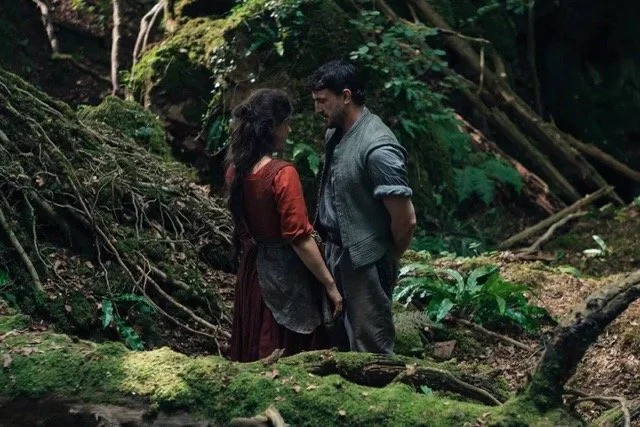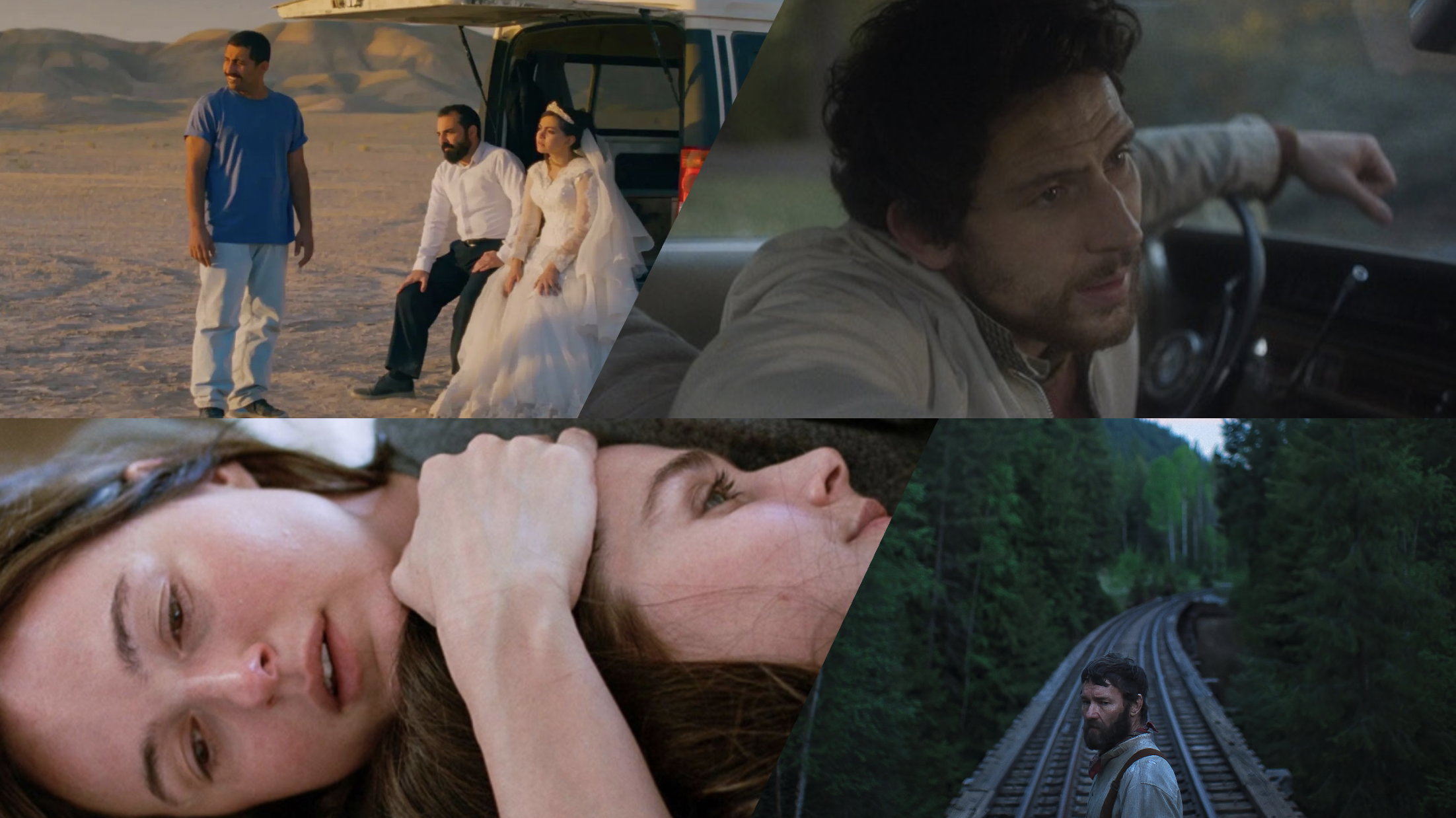Wes Anderson Finds God (and He Looks a Lot Like Bill Murray)
Coming on the heels of the most formally ambitious projects of his career—the one-two punch of the elaborately dense Asteroid City and the tetralogy of Roald Dahl shorts, all released within the same year—Wes Anderson could have gone in numerous directions. The path he chose to travel with The Phoenician Scheme results in a surprisingly linear tale. But linear doesn’t mean lesser, and Anderson has a lot on his mind.
At the heart of The Phoenician Scheme is Benicio del Toro’s Anatole Zsa-Zsa Korda, a wealthy business magnate known for his less than reputable, well, schemes. He’s hindered national economies, foiled diplomacy efforts, pissed off every business trying to dominate the market, narrowly survived assassination attempts, fathered ten children (many of whom are adopted), been a rather absent father to all of them, and cycled through a rotation of tutors in an attempt to master his interests—the latest tutor, Bjorn (Michael Cera), is teaching him about insects. In addition to all of this, Korda seems to have had a clenching realization that he can’t survive forever. Under the deft pretense of a business transaction, Korda makes his daughter, Liesl (Mea Threapleton), his sole heir and gives her the responsibility of completing his latest, his grandest, project.
Korda is, per his daughter’s own admission, “a swindling rogue.” He takes after his Andersonian forefather Royal Tenenbaum: a self-serving man whose life is fading, who concocts a complex plan for the sake of reconnecting with his estranged children, and who can hardly ever admit his faults or his emotions. (Of course, it’s doubtful that even Royal would have gone so far as to employ slave labor.)
This puts Liesl in a tight spot, as her intended path was aiming closer to a cloister than a mansion. Nevertheless, Korda, Liesl, and Bjorn ricochet their way around northern Africa and the eastern Mediterranean, contending with assassins, princes, nightclub owners, anticolonial troops, and even more perilous family members.
After its setup, The Phoenician Scheme becomes a bit of a travelogue as the trio jumps from train to plane to rail cart to cargo ship. Anderson has boyish delight with his story’s locale, setting up visual homages to Lawrence of Arabia and riffing on Casablanca. Most interesting, however, are the interruptions when Korda experiences visions of the afterlife, which The Phoenician Scheme depicts in cloudy black and white. The dialogue ceases to be snappy, becoming obtuse, instead; the blocking and costuming shift to an overtly theatrical mode; and the imagery veers into a more mystic territory than Anderson has ever explored. There’s more than a little of Ingmar Bergman to these interstitials, relying on the power of psychological provocation above clear symbology.
Stepping back down to earth and away from the formalist fun, The Phoenician Scheme lacks the narrative force of Anderson’s best. The machinations of the plot feel immaterial to the emotional journey between Korda and Liesl. In particular moments—the nightclub scene, the visions of final judgment—the film showcases Anderson and his cohorts at the top of their game. Other scenes and performances, however, are altogether superfluous. Tom Hanks and Bryan Cranston were extraordinary in Asteroid City; here they’re relegated to a game of horse that never develops beyond a stilted gag. Likewise for Scarlett Johansson, who has criminally little to do. And the meanest of exposition (tangential, excisable) is foisted on Rupert Friend, who brought such warmth to both Asteroid City and The Swan.
On the other end of the scales, Threapleton is a natural addition to the cadre, reveling in Liesl’s deadpan judgments, and the joy of watching Cera here induces giddiness. I would happily watch shorts focused on the life of Riz Ahmed’s Prince Farouk, the escapades of Richard Ayoade’s freedom fighter, and the shenanigans that Mathieu Amalric’s Marseille Bob has to put up with as he tries to keep his club running smoothly.
This is all about Korda, though, and del Toro gives a supreme performance. Because of del Toro’s dexterity, we know who Korda is from how he shoots a glance, but we also see right through him. We see the fear he can’t bear to admit. Korda is a bad father and a bad man; an evil man, it can be said without hesitancy. Organized killings, war profiteering, slave labor: his shot at a favorable eternal judgment seems nonexistent. Where’s the eye of a needle when you need one?
The religious themes are loud in The Phoenician Scheme (from the jump: the opening credits list some familiar names under “biblical troupe”), but it’s unclear how close they are to the heart of the film. We see Exodus 15:8 on the wall of a dam: “Lo, the current stood firm.” It could be a nod to Anderson’s deeper, spiritual intentions; it could be mere convenience. A map is briefly shown with locations named Jeroboam, Nebuchadnezzar, and Melchizedek. Is he leaning further into the biblical roots, or is he being a cheeky oenophile?
These concerns take center stage as the adventure becomes more treacherous. The visions multiply, and Korda takes begins to take on a role akin to a patriarch from Genesis. He is, perhaps, more of a Jacob than a Royal Tenenbaum. His greedy schemes thrust him far from his family, resulting in a decades-long wrestling match with his brother. But such schemes bear fruit, and his wealth abounds. He sees visions, though he’s more perturbed than transformed by them. He has many children, but there’s a clear favorite who is the primary benefactor of his riches. All of this to frame the question: What do we make of acts of faith from a bad man? It’s not only modern cinema that confronts us with such questions.
Beneath its knowing joviality, The Phoenician Scheme wants us to ponder the questionably enduring nature of evil and the significance of redemption. How much of the former can the latter outweigh? I don’t find that this film has the spiritual muscle of “Dear Alien, Who Art in Heaven”—but then, few things do.
Anderson’s latest bounces between an absurd romp and an ambiguous meditation. It’s engaging in both modes, though it doesn’t quite excel at either. Its imbalance doesn’t make it any less sincere, however, and maybe that’s what matters most. It’s not the form, but the sincerity.



